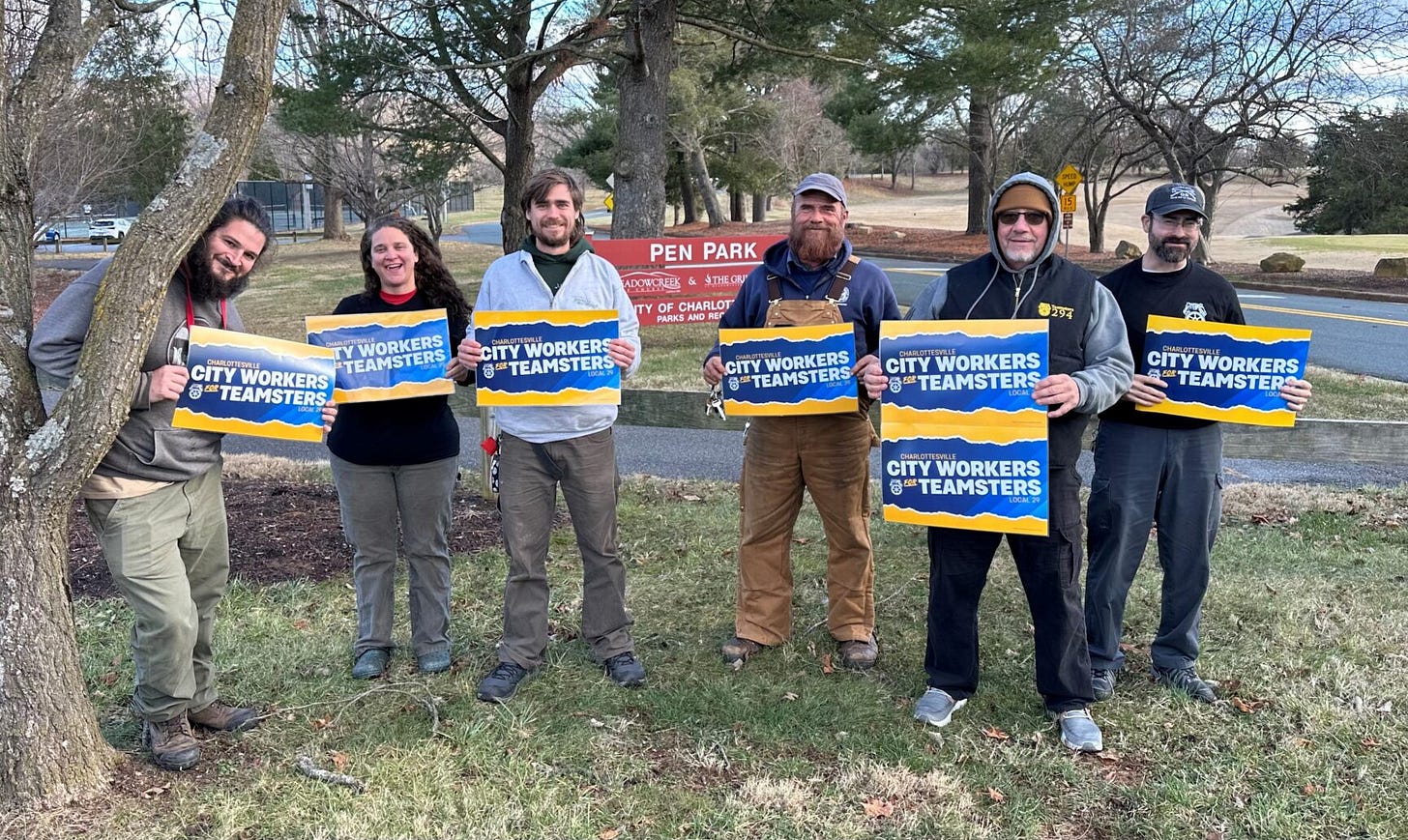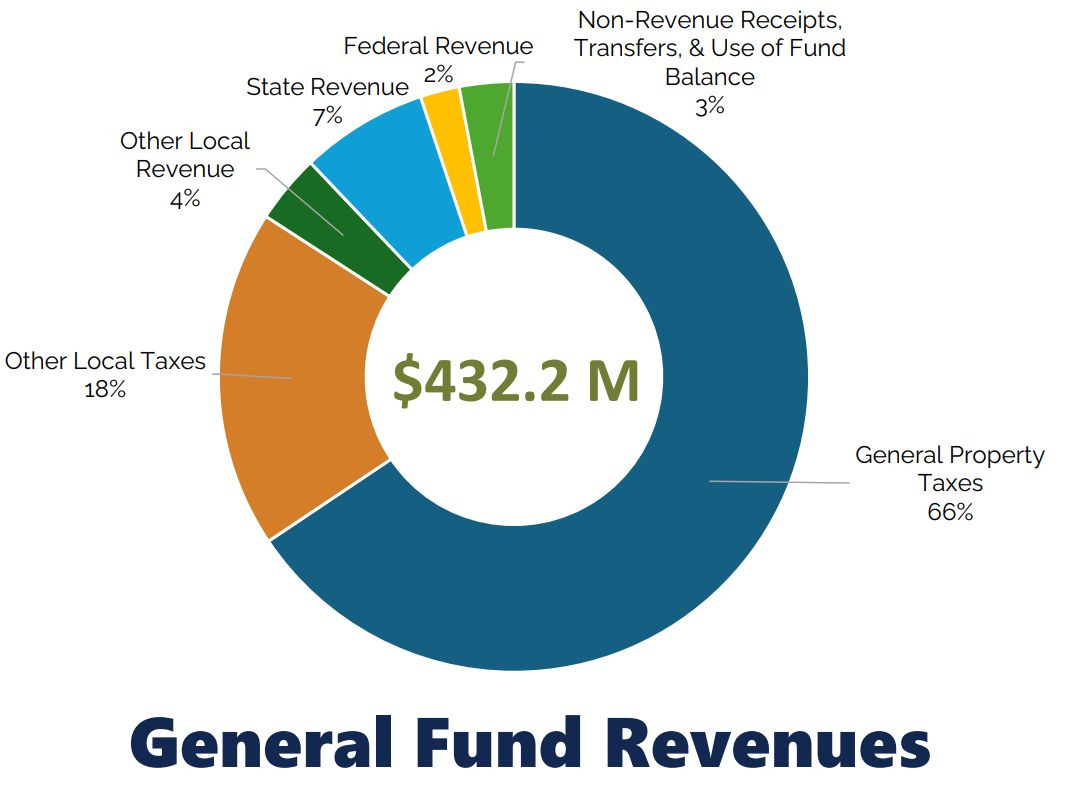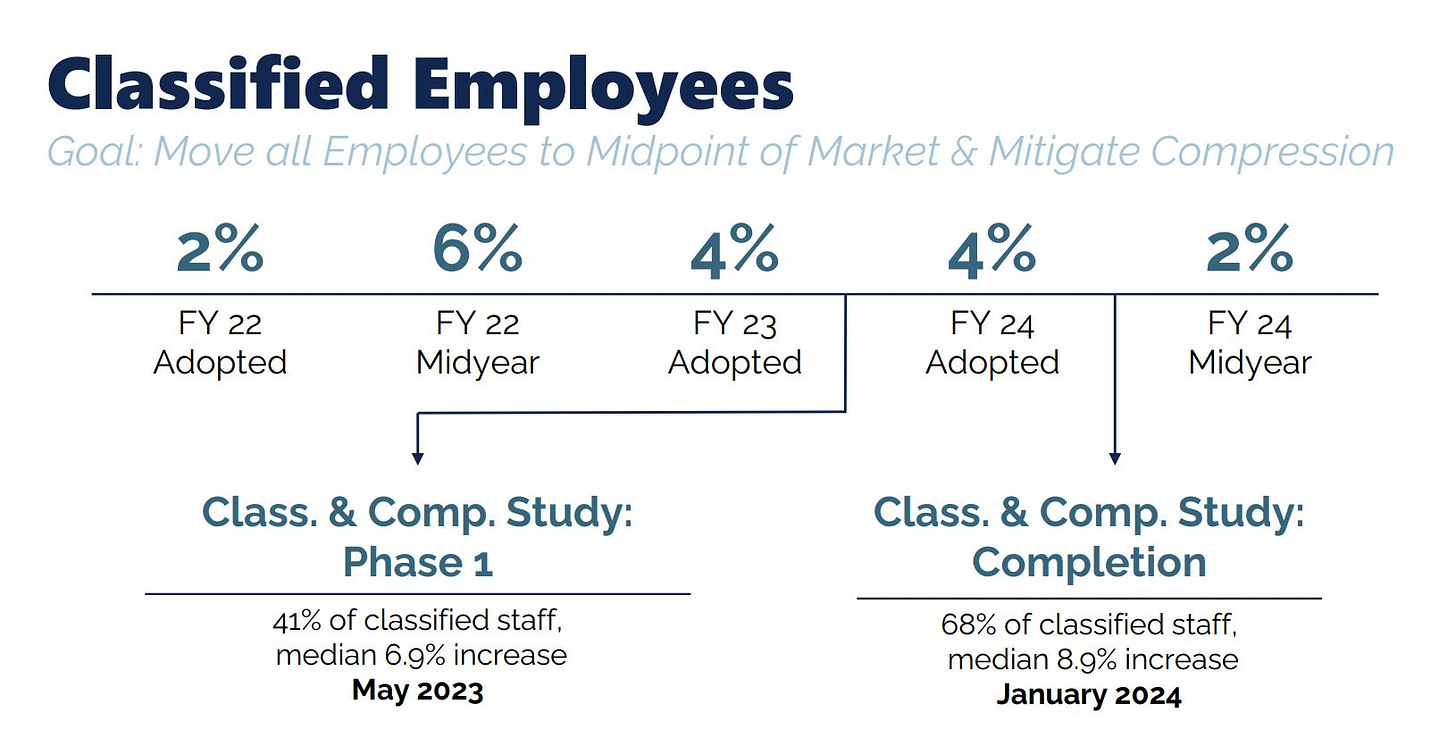It is Monday, March 18, 2024 and this is Charlottesville Community Engagement. This program began four years ago as a podcast I started to cover the local response to the pandemic. I took a leap of faith in the summer of 2020 to become an independent journalist and we’re now up to 648 editions of a newsletter and podcast that seeks to cover as much as possible about municipal government in the third decade of the 21st century in this small American community. I’m Sean Tubbs, glad you’re reading or listening.
On today’s show:
Another set of Charlottesville public employees have joined a union with the city’s labor and trades workers joining Teamsters Local 29
The Board of the Thomas Jefferson Planning District Commission approves continued work to develop by-laws for a potential regional transit authority
Governor Glenn Youngkin vetoes another set of bills including one that would have allowed localities to ban the sale of English Ivy
Albemarle County Supervisors began work reviewing a proposed $629 million budget with a review of revenues and expenditures
First shout-out: Judy Woodruff to address Emily Couric Leadership Forum on April 30
In today’s first subscriber-supported public service announcement: On April 30, the Emily Couric Leadership Forum will award $250,000 in scholarships to area high school women in recognition of leadership excellence at its annual Luncheon at the Omni Resort in Charlottesville. The keynote speaker for the event is Judy Woodruff, senior correspondent for the PBS Newshour. The group anticipates a sell out for this year’s luncheon, so this is a good time to buy a ticket. If they do sell out the event, there will be a wait list.
Find out more and consider your own donation at www.emilycouricleadershipforum.org/.
Charlottesville’s fourth collective bargaining unit to be represented by Teamsters Local 29
Another collective bargaining unit has been formed in Charlottesville with employees in several departments agreeing last week to join the Teamsters, according to a press release sent out Thursday by the labor organization.
“Workers in the City of Charlottesville’s Department of Public Works, Department of Public Utilities, Department of Parks and Recreation, Fire Department, and Office of Community Solutions have voted to join Teamsters Local 29,” reads the press release.
The election was held on Wednesday at the Carver Recreation Center with eligible city employees asked if they supported representation by Teamsters Local 29 or no representation at all.
The election was open to full-time and part-time employees “associated with maintenance and skilled crafts” or “job classes of workers performing duties that result directly in the comfort and convenience of the general public or contribute to the maintenance of capital assets, land and infrastructure of the City.” (view the notice)
The release states that 144 workers voted to join the Teamsters.
That ranges from Building Maintenance Mechanic I to Vehicle and Equipment Technician III.
The city’s adopted collective bargaining ordinance allowed for three units to be formed in the first year with one additional unit allowed per year through 2026. So far, one unit represents police officers and one unit represents most of the Charlottesville Fire Department.
In an election that ended on May 30, 2023, 35 ballots were cast by police employees to be represented by the Charlottesville Chapter of the Southern States Police Benevolent Association. The vote was unanimous. (read the decision)
In another election that ended on May 30, 2023, 70 employees of the Fire Department voted to be represented by the International Association of Fire Fighters Local 2363. That was also a unanimous vote. (read the decision)
In an election held on May 30, 2023, 57 Charlottesville Area Transit employees voted in a secret ballot to have the Amalgamated Transit Union represent them, and another nine voted against representation. (read the decision)
The remaining two bargaining units are for administrative and technical employees and professional employees. According to the ordinance, neither can be recognized until next year.
Public sector employees could not unionize in Virginia until legislation passed the General Assembly in 2020.
Youngkin takes action on 50 more bills
Fifty bills that passed the General Assembly crossed Governor Glenn Youngkin’s desk on March 14 and two-fifths of them were vetoed.
“The Governor vetoed 20 bills to prevent the enactment of laws that would impose significant burdens on small businesses, limit statewide decision-making, and escalate tuition fees and expenses for hardworking Virginia families,” reads a statement on the Governor’s website.
Here’s a selection of some of the vetoed legislation:
“Major Employment and Incentive” projects to be financed by the Virginia Public Building Authority would have been required by HB212 to submit a statement disclosing the demographic make-up of the managing boards of applicants. This passed the House of Delegates 49 to 46 and the Senate 21 to 19.
Members of the Virginia Council on Environmental Justice would have been allowed through HB333 for members to travel the Commonwealth “to view and record conditions related to human health and the environment.” This passed the House 51 to 48 and the Senate 20 to 19.
HB569 would have required businesses with more than ten employees that receives a complaint from a worker that the work has the right to file a charge with the U.S. Equal Employment Opportunity Commission or the Office of the Attorney General. In his explanation, Youngkin said the legislation would hurt small businesses.
HB938 and SB542 would have amended Virginia’s Unemployment Compensation Act related to labor dispute disqualifications
Localities would have been able to prohibit the sale of English Ivy under HB1167. Youngkin explained that this would set a precedent and that education is the best approach to eradicating invasive species.
HB1244 would have prohibited isolated confinement in state prisons and there does not appear to be a veto explanation for that one because the Governor’s explanations refer to a HB1255 which is a different piece of legislation.
Other bills vetoed were identical to ones Youngkin already refused to sign into law. They include HB571, HB990, HB1177, HB385, and SB370.

Bills signed by Youngkin that will become law without a recommendation include:
If you’re 70, you won’t be able to use that as a reason to get out of jury duty. HB156 and SB638 extend the age of exemption to 73.
Volunteer firefighters and emergency medical technicians can put more flashing warning lights on their vehicle with the adoption of HB15 and SB150.
Railway tunnels and bridges operated by the Virginia Passenger Rail Authority will be exempt from the Uniform Statewide Building Code and the Statewide Fire Prevention Code, but VPRA must make an annual safety report to the State Fire Marshall. (HB1425)
Motorists who strike an elk or a turkey can claim the carcass under HB1025. Currently only deer and bear are eligible.
Certain types of indoor agricultural equipment can be exempted from personal property taxes now that HB1429 has been signed into law.
Youngkin also signed a bill to give Wells Fargo a tax break for investing $87 million into a call center in Roanoke if at least 1,100 new jobs are created. For details, take a look at HB468 or read this press release from September 2023.
TJPDC Board approves further development of by-laws for Regional Transit Authority
Staff at the Thomas Jefferson Planning District Commission have spent the last two years on two studies intended to investigate the possibility of enhanced public transit service in the region. Lucinda Shannon is a planner with the regional agency.
“The consultant is recommending that we form a regional transit authority,” Shannon said. “That would do regional transit planning. It would bring in additional transit revenue. And also decide how to spend that revenue. It would have governance over the funding and the planning and also provide oversight to ensure that the public money is being spent well and efficiently."
The study also recommends a rural needs assessment and further collaboration with the University of Virginia which operates a bus system almost entirely separate from Charlottesville Area Transit. UVA is a member of the Regional Transit Partnership but has not committed to taking the next step and is not part of a work group that is drafting potential by-laws for an authority’s operations.
Staff at the TJPDC are continuing to work with Albemarle and Charlottesville on the next steps for the creation of an authority. Albemarle County Supervisor Ned Gallaway had this perspective.
“Charlottesville and UVA have functioning transit operations,” Gallaway said. “The urban ring of Albemarle County does not have a functional transit system.”
Gallaway said Albemarle sees the authority as a way of getting some say and control over a service they’re helping to pay for. County Executive Jeffrey Richardson has recommended a significant increase in transit funding in FY25 with the amount paid to Charlottesville Area Transit increasing 43 percent from $1.3 million this year to $1.86 million.
Albemarle is also increasing the amount it is spending on micro-transit from $450,000 in the current year to $1,741,887.
At their meeting on March 7, the TJPDC adopted a resolution accepting the final governance study and giving approval to staff to proceed with further work.
Sponsored message: Buy Local
From Crozet to Barracks Road, the Downtown Mall to the Shops at Stonefield, and everywhere in between, Albemarle County and Charlottesville’s Offices of Economic Development encourage you to Buy Local as spring approaches.
Buying locally supports our neighbors and community members and makes a big impact for our local economy. Local businesses are more likely to reinvest in our community and their goods and services contribute to the unique character of our community.
Learn more about how you can support local business at ShowLocalLove.org and on social media:
Albemarle Supervisors go through initial review of $629M budget for FY2025
There are still about six weeks to go until Albemarle County Supervisors will vote on a budget for fiscal year 2025. There have been three work sessions so far where elected officials go through the document for potential revisions.
“That’s going to be to the tenor of the first few work sessions we have scheduled but I want to point out a milestone on March 25,” said Andy Bowman, Albemarle’s chief of budget, at the first work session on March 6. “On that day, the Board of Supervisors will be asked to take action to propose a budget for public hearing and to propose tax rates for advertisement.”
Throughout the work session, county staff keep track of potential adjustments Supervisors might want to make in the budget. One item is how much money might Albemarle raise if they match Charlottesville City Council’s willingness to increase the transient lodging tax. (view the March 6, 2024 presentation)
One of the first items Supervisors requested after first seeing County Executive Jeffrey Richardson’s $629 million budget request was a list of items not funded. That list can be reviewed here.
“This total all-funds budget is an increase of about $74 million or 13 percent,” Bowman said. “When we look at the total budget, one of the biggest variables is the capital budget. By nature of capital projects, we’ll stop and start and change year to year based on what may be programmed.”
Albemarle plans to borrow about $62 million in FY25 with some of that going to pay for construction of a new elementary school in the county’s southern feeder pattern.
But capital is for another day. The topic for the first presentation dealt with the general fund budget which is based on $432.2 million in revenues. The FY25 budget is based on no increase on any of the tax rates.
“I will point out that food and beverage is at the statutory at six percent and the county does not have enabling authority to increase that one further, “ Bowman said.
Sixty-six percent of the general fund budget comes from real property taxes which are based on a rate of $0.854 per $100 of assessed value. Each penny is worth $2.9 million in revenues, but a formula with Albemarle County Public Schools would grant that agency 54 percent of any new funding that came in and ten percent would go to capital and debt service.
Bowman noted there is a 4.07 percent increase in real property assessments in 2024 and Virginia law mandates that the county tell community members about a “lowered” or “effective” tax rate.
“What this tax rate is essentially saying is that if the Board were to adopt a tax rate that essentially offsets that growth of 4.07 percent from reassessments, what would that tax rate be?” Bowman said. “In this case that is $0.821 percent per $100 of assessed value.”
Bowman also presented information on a concept known as the fund balance. This can be described as all of the money left over after spending in previous years, though some of it is already committed.
“If you were look into the audit, or if you look into our adopted budget, you would see at the end of fiscal year 2023, there is an unassigned fund balance of $91.3 million,” Bowman said. “To give a breakdown of what that funding is, most of that balance is committed in FY2024 based on the Board’s financial management policies.”
Those policies?
$48.1 million is set aside to meet requirements for the county to continue to maintain a AAA bond rating that requires cash on hand in case of an emergency
$9.6 million is in a budget stabilization reserve policy intended to be a first pool of funds to draw upon if there is a budget shortfall or some other need for funding without drawing from the AAA set-aside
$9.1 million goes to a school reserve for education
$15.6 million has been spent already based on decisions made by the Board of Supervisors in the current fiscal year
Another $8.8 million goes to one-time expenses including $1.3 million to a fund for health care for county employees and $2 million toward the county’s housing fund
At this point, Bowman took a pause to seek questions from Supervisors. Scottsville District Supervisor Mike Pruitt had a question about that $48.1 million.
“Is this like an operating slush fund for overruns and unexpecteds that we have in a given year?” Pruitt asked. “How should I interpret what this is doing? Is it carried over year to year? Is it used to pencil out next year’s budget?”
Bowman said the expectation from the rating agencies that grant the AAA bond rating is that the funding is to be there for an emergency and replenished if any of the funds are used.
Jacob Sumner, the county’s chief financial officer, had a further explanation of why bond agencies want to see cash-on-hand equal to ten percent of the budget.
“This is one of the key metrics the ratings agencies and the financial markets look at to see what is our stability, our fiscal stability,” Sumner said. “The dollar amount that you see there is an accumulation over years and years and year and years of solid budget planning and fiscal stewardship.”
Pruitt questioned whether Albemarle was being too conservative and whether there needed to be such a cautious approach.
“I do think that the purpose of government and government money is to react to needs that are before us and while I appreciate that fiscal stability and proper planning are important considerations and things, I don’t think it is a goal of government,” Pruitt said.
Bowman said he would come back with more information on fund balance policies for other localities with AAA bond ratings.
Supervisor Ned Gallaway defended the county’s decision a few years go to create the budget stabilization reserve that seeks to set aside two percent of the budget.
“The two percent stabilization reserve isn’t so much of a requirement as a choice this Board made and I support that choice,” Gallaway said. “I think the pandemic is probably the closest lesson we got and we were able to maneuver that thanks to Mr. Richardson’s leadership and the staff of getting through that without touching the ten percent.”
Gallaway said when the pandemic hit, the stabilization reserve provided a cushion at a time when it was not yet known whether emergency funding would come from the federal government in the form of the CARES Act and the American Rescue Plan Act.
“Before we knew ARPA money was coming, we locked away money for cash needs that we did know if we would need,” Gallaway said.
Supervisor Jim Andrews drew attention to the amount of revenue received from the University of Virginia, an entity exempt from property taxes.
“It’s a whopping $133,000 but it’s dropped by 33 percent and I was curious as to how that amount gets determined and estimated,” Andrews said. “I really don’t understand it.”
Bowman said he would return to the Board with an explanation.
After going through the revenues, Bowman took Supervisors through some of the highlights in expenditures. Here are some related to human resources.
$4.3 million to implement the Classification and Compensation Study and a two percent cost of living adjustment in the current fiscal year
$1.1 million for a mid-year salary review to bring position to market rate
$1.5 million to cover the cost of providing health care insurance to employees
Bowman said as a result of the work to date, turnover has declined from 13.4 percent in FY23 to a projected rate of 11.3 percent in FY24. There were 35 vacancies on March 6 compared to a peak of 80 during FY23.
There are fewer new positions being recommended to be added in FY25 than in recent years with 6.6 full-time equivalents. Between FY20 and FY24, an average of 31.3 full-time equivalents was added.
More from Albemarle County’s budget as I can get through it.
Reading material:
UVA Students Lay Down the Law on AI, Bryan McKenzie, UVA Today, March 14, 2024
ACPS moving ahead with redistricting some schools, Garret Whitton, CBS19 News, March 14, 2024
Meeting coming up on proposals to improve Stribling Avenue, CBS19 News, March 15, 2024
The Biltmore is no more: Ellie's Country Club rises on the Corner, Emily Hemphill, Charlottesville Daily Progress (paywall), March 16, 2024
Class of 2028: UVA Offers Entry to Nearly 2,000 in Regular Decision Round, Jane Kelly, UVA Today, March 15, 2024
‘Unreasonable restriction’: Court reverses BZA’s variance denial, Nick Hurston, Virginia Lawyers Weekly, March 17, 2024
Albemarle School Board OKs redistricting, Jason Armesto, Charlottesville Daily Progress (paywall), March 18, 2024
3 affordable housing projects in Charlottesville awarded more than $13M, Jason Armesto, Charlottesville Daily Progress (paywall), March 18, 2024
Why did #648 take so long to publish?
There’s still a particular gravity that drives the work of Town Crier Productions and much of this edition was written late last Friday. Why did it take so long to publish? Good question! I had hoped to publish on Saturday, but then Saturday ended up being a very nice day and I decided to take some time off.
And then Sunday’s Week Ahead ended up being published this morning, and for the very first time I have two long-form newsletters coming out on the same day. That may or may not happen again. The hope is to find people interested in learning how to be a reporter and researcher, and to provide a way for those individuals with experience. Behind the scenes, I’m building a system, a system fueled by all of your who have opted for a Substack subscription or a Patreon membership. I’m excited to see where this all goes.
And if you are a Substack subscriber, you are helping to keep this going and I really appreciate it. You should know by now that if you do pay for a subscription through Substack, Ting will match your initial payment!
This is an incredibly generous sponsorship, and you if you sign up for service and enter the promo code COMMUNITY you’re going to get:
Free installation
A second month for free
A $75 gift card to the Downtown Mall




















Share this post